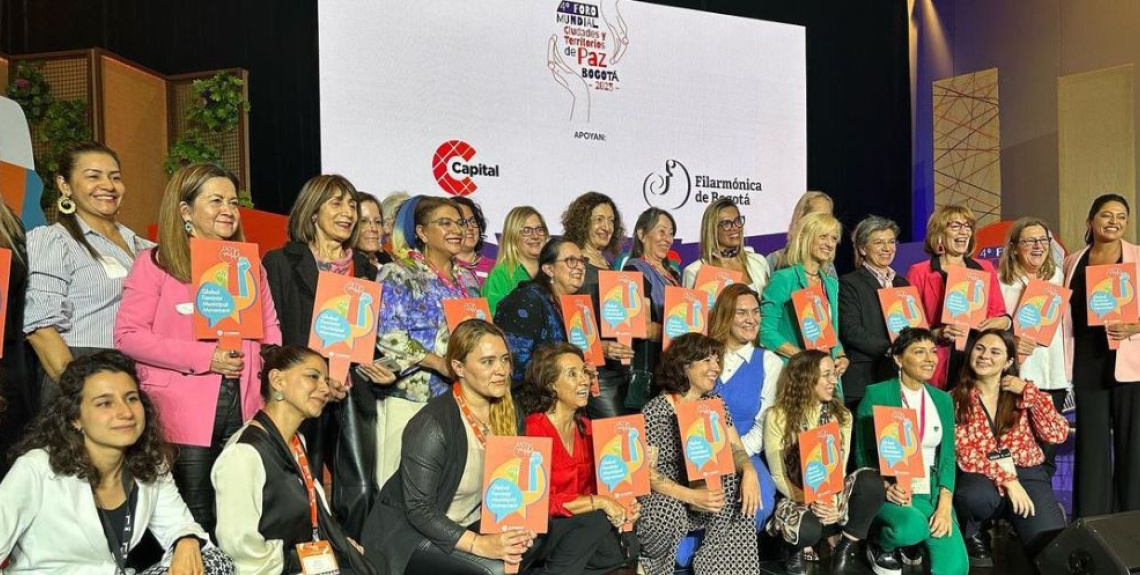The Committee on Social Inclusion, Participatory Democracy and Human Rights of United Cities and Local Governments (CSIPDHR-UCLG) participated in the World Forum Cities and Territories of Peace, which took place from 26 to 28 June 2023 in Bogota. The Forum was a space for encounter and solidarity that brought together local leaders, international organisations and citizens with a very clear call:
To put the peace culture as security, care and equal opportunities for all people at the forefront of local action with an international perspective.
On the first day of the Forum, CSIPDHR-UCLG organised the "Consultation with the UN Rapporteur on violence against women," in the framework of the Co-Learning Lab "Towards Feminist Municipalism: institutionalising women's rights and eradicating gender-based violence". Eleven women leaders from local governments in Latin America and Europe participated in the consultation: Clara Brugada, Mayor of Iztapalapa (Mexico City); Lily Caravantes, Councillor of the Municipality of Guatemala; Claudia López, Mayor of Bogotá (Colombia); Mayra Mendoza, Mayor of the Municipality of Quilmes (Argentina); Paola Pabon, Prefect of Pichincha (Ecuador); Silvana Pissano, Mayor of Municipio B (Uruguay); and Tatiana Piñeiros, Mayor of Ciudad Bolívar (Colombia); Amélie Videau, Head and Coordinator of the International Observatory on Violence against Women of Seine-Saint-Denis (France); Thamyris Machareth Elpídio, Director of the Coordination of Policies and Women's Rights of the Municipality of Niterói (Brazil); and Carola Gunnarson, UCLG’s Special Envoy for Freedom and Solidarity and Combating Violence and Vice-President of the Swedish Association of Local Authorities and Regions (SALAR).
During the consultation, Rapporteur Reem Alsalem listened to the women mayors, who shared their municipal experiences around the care agenda, as well as the challenges they face in preventing and eradicating violence against women and girls. Clara Brugada, Mayor of Iztapalapa, summarised:
"Building caring territories for women victims of gender-based violence is one of our commitments as local governments."
In this exchange of experiences and knowledge, the local women leaders agreed that, in order to tackle the structural and systemic problem of violence against women, three pillars are fundamental. The first is to implement an integral perspective to take care of the physical, mental and reproductive health of women so that they can be confident and make decisions about their bodies, as was put on the table by Mayor Paola Pabón. Second, to shed light on the different types of violence that women suffer, such as economic violence, which deprives them of their independence and their ability to denounce, as local leaders Tatiana Piñeros and Mayra Mendoza agreed. Specifically, Tatiana Piñeros promotes a specific care agenda for the trans community in Ciudad Bolivar. While Mayra Mendoza paid attention to the third pillar, which is the linkage and cooperation of local governments with international initiatives.
On the second day of the forum, the mayors and CSIPDHR visited the Manzanas del Cuidado (Care blocks), one of the City of Bogotá's flagship initiatives. These spaces offer training and work opportunities to women who look after dependent people, who suffer from time and economic poverty because they receive no remuneration for looking after their family's survival. Manzanas del Cuidado frees up time for women, tackling systemic asymmetries and inequalities. For example, family members and dependents (children, grandparents, people with disabilities) can be looked after by specialised carers sent by the municipality, so that the women can have time to pursue wellness activities to strengthen their abilities and train themselves. Washing machines are provided free of charge for families, and "Hombres del cuidado'' workshops are run to train men to look after their families, for example by learning how to change nappies or do their children's hair. To date, 17 of Bogotá's 20 localities are covered and two mobile units serve women living in rural areas.
It is precisely by bringing services closer to the people that social transformation is fostered, because peace allows for the presence of equity and dignity in our societies,
as Jorge Sharp, Mayor of Valparaíso, explained during the discussion on the axis of social peace, which took place on the last day of the forum. For the first time in Chile, the mayor of Valparaíso opened a department for gender equality and women's rights within his administration.
It is a fact that violence in cities and local territories is multidimensional in nature, and therefore requires responses of the same nature, in coherence with the most recent international agendas, such as the United Nations Secretary General's Common Agenda, the 2030 Agenda and the New Urban Agenda. In this multilateralism, the contribution of cities and local governments is fundamental due to their proximity to communities. It is from localities that the momentum for the transformative collaboration we need to address the systemic roots of violence and structural inequalities that affect women and other vulnerable groups begins.
From the CSIPDHR cities, we support this systemic transformation with a human rights and policy approach to move towards a new social contract based on care to build cities, territories and societies of peace.
This is the call of the Bogota Declaration, a document that brings together the purposes set out in this edition to sign the peace between people, for the planet and with the government towards the next forum, which will take place in Montevideo in 2025.


